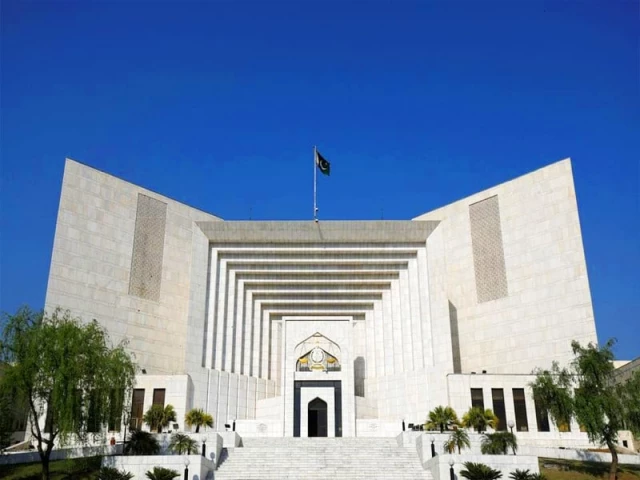The Supreme Court has questioned the federal treatment of the Federal Council (FBR) of the Super Tax case, judge Muhammad Ali Mazhar observing that “the whole burden consists of the common man”.
A constitutional bench of five members, led by Judge Aminuddin Khan, took over petitions contesting the taxation of super taxes by the government of Pakistan Muslim League-Nawaz (PML-N) in 2015 to collect funds for people displaced by Operation Zarb-Ezb.
Hearing the arguments of FBR ASMA Hamid’s lawyer on Friday, the court responded to the impact of the tax on ordinary citizens.
Hamid informed the bench according to which two paragraphs of the High Court of Islamabad (IHC) have contradicted – one declared that no tax would be collected and that the other authorizes it.
Judge Hasan Azhar Rizvi pointed out that the Super Tax led to the loss of companies and policies called into question affecting the elderly.
Read: No taxpayers challenged the LHC decision while respecting Super Tax, FBR explains the Supreme Court
The bench also examined the deductions of the provident funds. Judge Mazhar asked if the funds had reached widows, while Judge Rizvi wondered if companies could transfer amounts to other accounts if widows were the net beneficiaries.
To this, Hamid replied that she could guide the court on legal points but had no knowledge of financial loss or social benefits.
Judge Mazhar pointed out that the procedure turned into a question “I am attacked” and underlined the procedural complications.
To this, Hamid argued that articles 4C and 9 of the income tax order, 2001, should be read together, section 4C remaining a complete section.
Article 4C of the ordinance decomposes “income” such as the amount of profit on debt, dividend, capital gains, brokerage and commission while taxable income as defined by article 9 refers to “total income … of the person for the reduced year (but not below zero) by the total deductible allowance … for the year”.
The FBR member Dr ishtiaq interjection to add that the case concerned income, not individual taxpayers.
Justice Jamal Khan Mandokhail asked for clarity on the basis of petitions and wondered if the objections had been officially raised or parasped after a notice of justification.
Hamid responded in the affirmative to the latter and added that she represented the FBR in 20 other cases going through the court.
The bench has inquired about the tax rate in addition to trying to understand why articles 4C and 9 read together would not prevail over the definition of income or granting exemptions.
Hamid maintained that changes to the law after the 1979 ordinance had already set the tax rate.
Super taxes
The Super Tax is an additional direct debit on individuals, companies and high industries, intended for large companies. In the federal budget of 2022-2023, the government has imposed up to 10% super taxes on the main sectors, including cement, steel, sugar, oil and gas, fertilizers, banks and textiles, citing the need to increase additional income for economic stabilization.
Petitions contesting the levy were filed before the Superior Court by individuals and organizations. During the previous hearing, the bench was informed by the FBR that no one had disputed the verdict of the High Court of Lahore (LHC), respecting the legality of the super tax imposed under article 4C of the income tax order, 2001, while reducing its rate from 10% to 4% for 16 sectors, including the bank and offering partial lightening to petitioners.
Earlier this year, the Apex Court wondered if the center could distribute subsequent tax revenue to the provinces, noting that if the levy has been extended since 2016, no funds had been used for the declared objective.
Find out more: The Supreme Court CB gives the distribution of super taxes to the provinces
During a recent audience, the bench raised concerns about the impact of the super tax on ordinary citizens, judge Mazhar observing that it was a bag of cement or an expedition of liquefied natural gas, “the whole burden is common man”.
“Business will flourish, if we make things easier for people,” he added.
“Do not discourage taxpayers – when you do it, people end up leaving the country,” warned judge Mandokhail.
Hamid then said that only 15 sectors with revenues exceeding 300 million rupees were responsible for the super tax and that no business had claimed an inability to pay. The bench pressed the FBR to explain why the distinctions among taxpayers have been created, stressing that budgetary measures should not redo the burden to the public.




